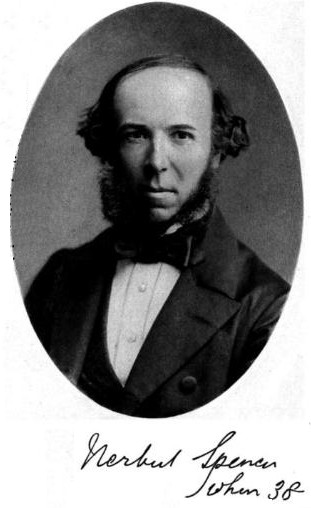Liberty Matters
Spencer and Eugenic Legislation

David and George raise the question of Spencer’s role in eugenics. While eugenicists certainly tried to make use of Spencerian ideas in ways that Spencer would not have approved, I don’t think he can be regarded as completely innocent. In an 1892 letter to a Japanese official, for example, Spencer advises that the “inter-marriage of foreigners and Japanese” should be “positively forbidden” in order to prevent the “chaotic constitution” that an “incalculable mixture of traits” would naturally produce.[128] That such a policy would violate the law of equal freedom Spencer was well aware; but pursuant to the historical relativism of which George rightly complains, Spencer regards Japan as a less developed culture than Britain and so less ready for the implementation of libertarian ideals. Spencer was thus prepared in certain contexts to countenance eugenicist legislation.
Hence we should not whitewash Spencer’s eugenicist leanings. But we should not exaggerate them either. As I’ve written elsewhere:
Spencer’s assumption that the application of libertarian principle must be qualified in the case of societies with no tradition of self-governance is shared by John Stuart Mill.... Mill is generally forgiven for saying things like this, whereas when Spencer says similar things he is consigned to outer darkness. Yet on this point Mill is surely worse than Spencer, since from the alleged “nonage” of non-European peoples Mill inferred the legitimacy of British colonial rule, in India for example ... whereas Spencer remained a lifelong opponent of imperialism and Britain’s India policy. From the assumption (be it true or false) that Japan was not ready for freedom, Mill would have been ready to infer that Japan should be subjected to British rule; Spencer on the contrary infers that Japan should do everything in its power to prevent being so subjected.[129]
Considering that such thinkers as Aristotle, Hume, Voltaire, and Kant continue to be respected despite the appalling racism of which they were capable, it seems a bit hypocritical to hold Spencer to a higher standard. But that is no reason to ignore or excuse Spencer’s racism either.
Endnotes
[128.] Letter to Kaneko Kentaro, 26 August 1892. <https://praxeology.net/HS-LKK.htm>
[129.] Roderick T. Long, “Big in Japan,” Austro-Athenian Empire, 1 September 2005. <https://praxeology.net/unblog09-05.htm#01>.
Copyright and Fair Use Statement
“Liberty Matters” is the copyright of Liberty Fund, Inc. This material is put on line to further the educational goals of Liberty Fund, Inc. These essays and responses may be quoted and otherwise used under “fair use” provisions for educational and academic purposes. To reprint these essays in course booklets requires the prior permission of Liberty Fund, Inc. Please contact oll@libertyfund.org if you have any questions.